孔子思想介绍英文版
- 格式:pptx
- 大小:2.67 MB
- 文档页数:14
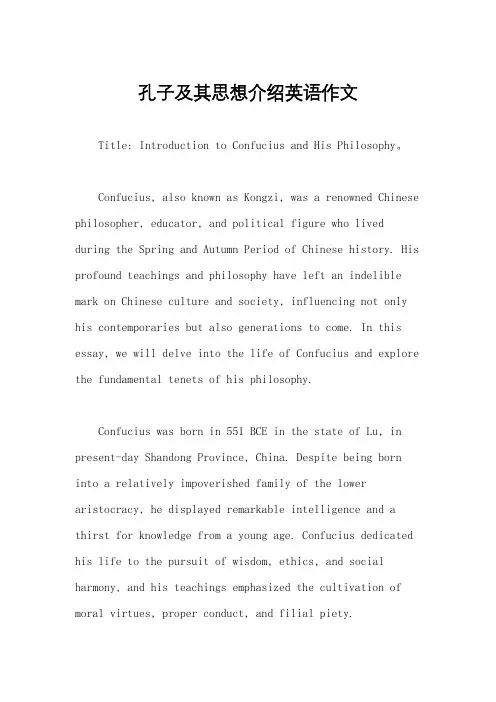
孔子及其思想介绍英语作文Title: Introduction to Confucius and His Philosophy。
Confucius, also known as Kongzi, was a renowned Chinese philosopher, educator, and political figure who lived during the Spring and Autumn Period of Chinese history. His profound teachings and philosophy have left an indelible mark on Chinese culture and society, influencing not only his contemporaries but also generations to come. In this essay, we will delve into the life of Confucius and explore the fundamental tenets of his philosophy.Confucius was born in 551 BCE in the state of Lu, in present-day Shandong Province, China. Despite being born into a relatively impoverished family of the lower aristocracy, he displayed remarkable intelligence and a thirst for knowledge from a young age. Confucius dedicated his life to the pursuit of wisdom, ethics, and social harmony, and his teachings emphasized the cultivation of moral virtues, proper conduct, and filial piety.At the heart of Confucian philosophy is the concept of ren, often translated as "benevolence" or "humanity." Confucius believed that the ultimate goal of human life was the attainment of ren, which he described as the essence of being truly human. Ren entails compassion, empathy, and a sense of responsibility towards others, and it forms the foundation of ethical behavior and social harmony in Confucian thought.Another central concept in Confucianism is li, which encompasses ritual propriety, etiquette, and social norms. Confucius emphasized the importance of observing proper conduct and etiquette in various social interactions, from family rituals to governmental ceremonies. He believed that adherence to li fostered respect for hierarchy, maintained social order, and promoted harmony within society.In addition to ren and li, Confucianism places great emphasis on the virtue of filial piety, or xiao. Confucius regarded filial piety as the cornerstone of moral development and social stability. He emphasized theimportance of respecting and honoring one's parents, ancestors, and elders, viewing it as a fundamental obligation that lay at the heart of a harmonious family and society.Confucius's teachings also encompassed the notion of junzi, often translated as "gentleman" or "noble person." A junzi, according to Confucianism, is an individual who embodies moral integrity, cultivates self-cultivation, and serves as a role model for others. Confucius believed that society would flourish if governed by junzi who exemplified virtue and ethical leadership.Throughout his life, Confucius served as an educator and political advisor, imparting his wisdom to disciples and officials alike. Despite facing opposition and exile during his lifetime, his teachings gradually gained prominence and became the foundation of Chinese cultural and moral values.In summary, Confucius and his philosophy have had a profound and enduring influence on Chinese civilization.His emphasis on moral virtue, social harmony, and ethical conduct continues to resonate in contemporary Chinese society and beyond. By studying Confucianism, we gain insights into the timeless principles of human morality and the pursuit of a harmonious society.。
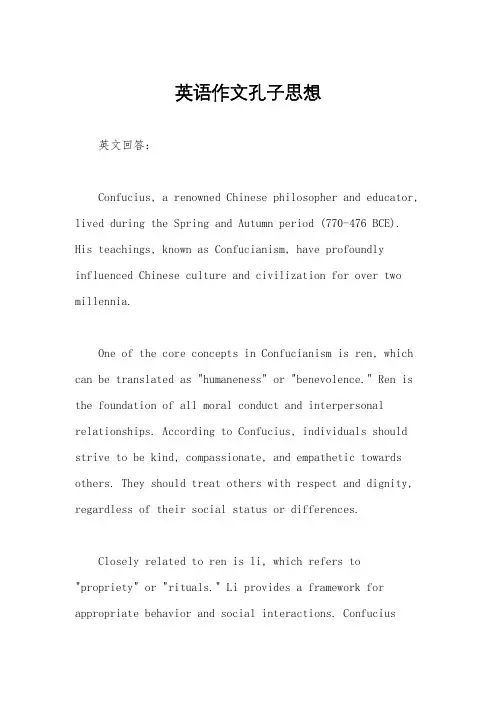
英语作文孔子思想英文回答:Confucius, a renowned Chinese philosopher and educator, lived during the Spring and Autumn period (770-476 BCE). His teachings, known as Confucianism, have profoundly influenced Chinese culture and civilization for over two millennia.One of the core concepts in Confucianism is ren, which can be translated as "humaneness" or "benevolence." Ren is the foundation of all moral conduct and interpersonal relationships. According to Confucius, individuals should strive to be kind, compassionate, and empathetic towards others. They should treat others with respect and dignity, regardless of their social status or differences.Closely related to ren is li, which refers to "propriety" or "rituals." Li provides a framework for appropriate behavior and social interactions. Confuciusbelieved that adhering to established social norms and customs promoted harmony and order within society. However, he also emphasized that li should not be rigid or oppressive, but should be adaptable to changing circumstances and contexts.Another important aspect of Confucianism is xiao, or "filial piety." Xiao is the virtue of respecting and honoring one's parents and ancestors. Confucius taught that children should obey and care for their parents, and in turn, parents should provide guidance and support to their children. Xiao extends beyond the immediate family toinclude extended family members, such as grandparents and siblings.Confucianism also places great importance on education. Confucius believed that education was essential forpersonal and societal development. He established a private school where he taught students from all social backgrounds. Confucius's teachings focused on the cultivation of virtue, morality, and intellectual inquiry.Confucianism has had a profound impact on Chinese culture and society. It has shaped Chinese values, social norms, and political systems. Confucian ideals of harmony, respect for authority, and education have been instrumental in maintaining societal stability and promoting cultural continuity.In addition to its influence in China, Confucianism has also spread to other parts of East Asia, including Korea, Japan, and Vietnam. It has influenced the development of social and ethical systems in these countries and has contributed to the formation of a shared cultural heritage in the region.中文回答:孔子是一位著名的中国哲学家和教育家,生活在春秋时期(公元前 770-476 年)。
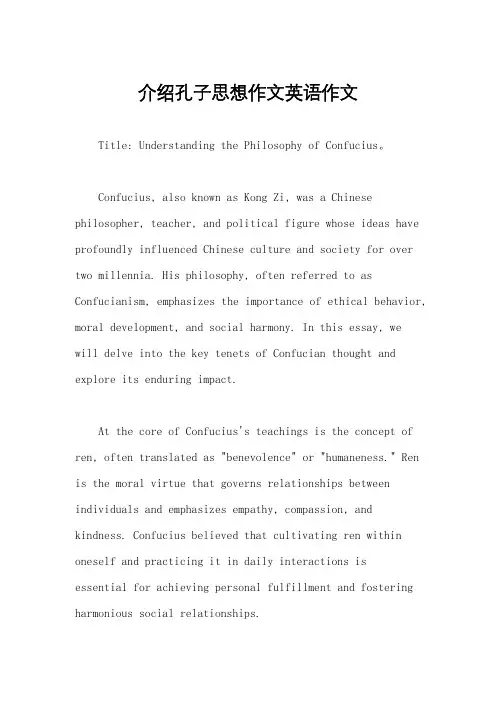
介绍孔子思想作文英语作文Title: Understanding the Philosophy of Confucius。
Confucius, also known as Kong Zi, was a Chinese philosopher, teacher, and political figure whose ideas have profoundly influenced Chinese culture and society for over two millennia. His philosophy, often referred to as Confucianism, emphasizes the importance of ethical behavior, moral development, and social harmony. In this essay, wewill delve into the key tenets of Confucian thought and explore its enduring impact.At the core of Confucius's teachings is the concept of ren, often translated as "benevolence" or "humaneness." Ren is the moral virtue that governs relationships between individuals and emphasizes empathy, compassion, and kindness. Confucius believed that cultivating ren within oneself and practicing it in daily interactions isessential for achieving personal fulfillment and fostering harmonious social relationships.Another fundamental principle in Confucianism is li, which can be translated as "ritual" or "propriety." Li encompasses a wide range of social norms, etiquette, and customs that govern behavior in various contexts, from family and community to government and society. Confucius emphasized the importance of observing li as a means of promoting social order, respect for authority, and mutual respect among individuals.Furthermore, Confucius stressed the significance of filial piety, or xiao, which involves showing reverence and obedience to one's parents and ancestors. Filial piety is regarded as the foundation of moral cultivation and social harmony in Confucianism, as it reinforces the bonds of family and strengthens the fabric of society.In addition to these ethical principles, Confucius also offered insights into effective governance and leadership. He advocated for the concept of a virtuous ruler, or junzi, who leads by example, governs with wisdom and benevolence, and prioritizes the welfare of the people. Confuciusbelieved that a just and virtuous government would inspire loyalty and obedience among its citizens, thus ensuring stability and prosperity for society as a whole.Moreover, Confucius emphasized the importance of education as a means of moral and intellectual development. He believed that education should focus not only on imparting knowledge and skills but also on cultivating moral character and instilling a sense of duty and responsibility towards others. Confucius's emphasis on lifelong learning and self-improvement continues to resonate in Chinese educational traditions to this day.Throughout history, Confucianism has exerted a profound influence on Chinese society, politics, and culture. Its emphasis on ethical behavior, social harmony, and filial piety has shaped the moral values and social norms of countless generations. Even in the modern era, Confucian principles continue to inform moral discourse and guide ethical decision-making in China and beyond.In conclusion, the philosophy of Confucius offerstimeless wisdom and insights into the nature of human relationships, moral conduct, and social order. By embracing principles such as ren, li, and filial piety, individuals can cultivate virtuous character and contribute to a more harmonious and compassionate society. As we reflect on the teachings of Confucius, we are reminded of the enduring relevance of his ideas in an ever-changing world.。
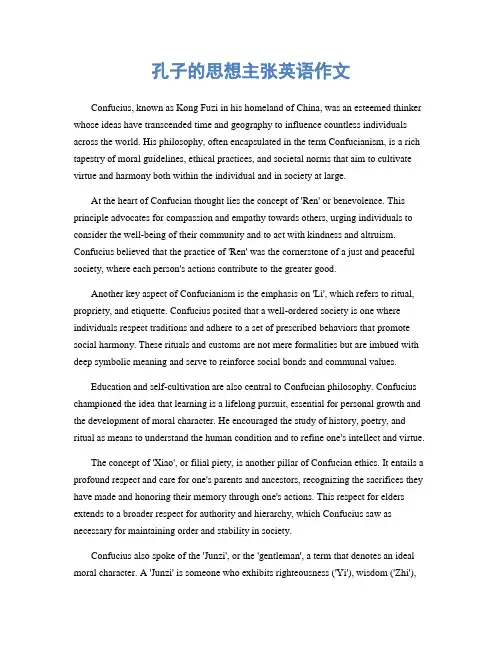
孔子的思想主张英语作文Confucius, known as Kong Fuzi in his homeland of China, was an esteemed thinker whose ideas have transcended time and geography to influence countless individuals across the world. His philosophy, often encapsulated in the term Confucianism, is a rich tapestry of moral guidelines, ethical practices, and societal norms that aim to cultivate virtue and harmony both within the individual and in society at large.At the heart of Confucian thought lies the concept of 'Ren' or benevolence. This principle advocates for compassion and empathy towards others, urging individuals to consider the well-being of their community and to act with kindness and altruism. Confucius believed that the practice of 'Ren' was the cornerstone of a just and peaceful society, where each person's actions contribute to the greater good.Another key aspect of Confucianism is the emphasis on 'Li', which refers to ritual, propriety, and etiquette. Confucius posited that a well-ordered society is one where individuals respect traditions and adhere to a set of prescribed behaviors that promote social harmony. These rituals and customs are not mere formalities but are imbued with deep symbolic meaning and serve to reinforce social bonds and communal values.Education and self-cultivation are also central to Confucian philosophy. Confucius championed the idea that learning is a lifelong pursuit, essential for personal growth and the development of moral character. He encouraged the study of history, poetry, and ritual as means to understand the human condition and to refine one's intellect and virtue.The concept of 'Xiao', or filial piety, is another pillar of Confucian ethics. It entails a profound respect and care for one's parents and ancestors, recognizing the sacrifices they have made and honoring their memory through one's actions. This respect for elders extends to a broader respect for authority and hierarchy, which Confucius saw as necessary for maintaining order and stability in society.Confucius also spoke of the 'Junzi', or the 'gentleman', a term that denotes an ideal moral character. A 'Junzi' is someone who exhibits righteousness ('Yi'), wisdom ('Zhi'),and faithfulness ('Xin'), and who acts with integrity and moral fortitude. The 'Junzi' serves as a role model for others, leading by example and striving to create a virtuous community.In governance, Confucius advocated for leaders who are virtuous and wise, believing that the moral character of a ruler is reflected in the state of the nation. He argued that a just ruler who governs with benevolence and fairness will inspire the same qualities in their subjects, leading to a harmonious and prosperous society.The influence of Confucianism extends beyond individual morality and social ethics; it has shaped educational systems, informed political structures, and guided interpersonal relationships throughout East Asia and beyond. Its principles of mutual respect, communal responsibility, and moral rectitude continue to resonate in modern times, offering timeless wisdom on how to live a meaningful and ethical life.In conclusion, the teachings of Confucius provide a framework for personal development and social cohesion. His advocacy for benevolence, respect for tradition, emphasis on education, filial piety, and the cultivation of moral character all contribute to a vision of society where individuals live in harmony with one another and work together towards the common good. As we navigate the complexities of the contemporary world, the enduring wisdom of Confucius remains a beacon, guiding us towards a more compassionate and just society. 。
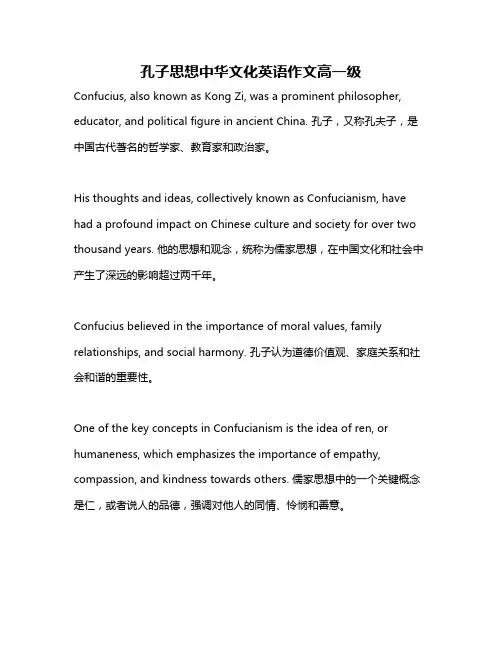
孔子思想中华文化英语作文高一级Confucius, also known as Kong Zi, was a prominent philosopher, educator, and political figure in ancient China. 孔子,又称孔夫子,是中国古代著名的哲学家、教育家和政治家。
His thoughts and ideas, collectively known as Confucianism, have had a profound impact on Chinese culture and society for over two thousand years. 他的思想和观念,统称为儒家思想,在中国文化和社会中产生了深远的影响超过两千年。
Confucius believed in the importance of moral values, family relationships, and social harmony. 孔子认为道德价值观、家庭关系和社会和谐的重要性。
One of the key concepts in Confucianism is the idea of ren, or humaneness, which emphasizes the importance of empathy, compassion, and kindness towards others. 儒家思想中的一个关键概念是仁,或者说人的品德,强调对他人的同情、怜悯和善意。
Confucius believed that individuals should strive to cultivate these virtues in order to become morally upright and contribute to a harmonious society. 孔子认为个人应该努力培养这些美德,以成为道德正直并为和谐社会做出贡献。
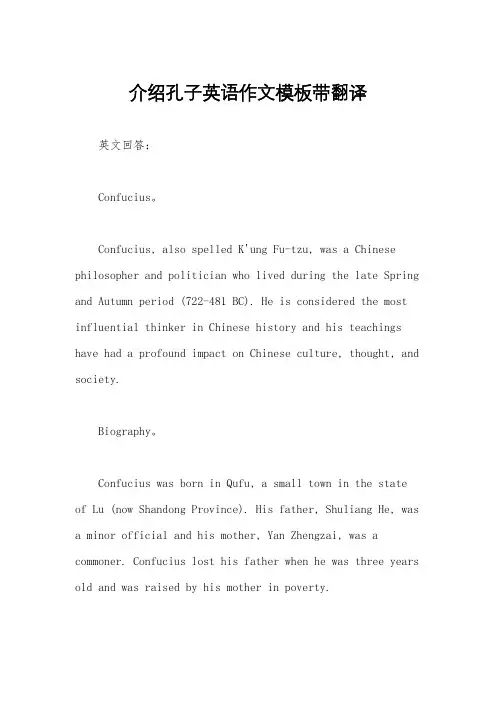
介绍孔子英语作文模板带翻译英文回答:Confucius。
Confucius, also spelled K'ung Fu-tzu, was a Chinese philosopher and politician who lived during the late Spring and Autumn period (722-481 BC). He is considered the most influential thinker in Chinese history and his teachings have had a profound impact on Chinese culture, thought, and society.Biography。
Confucius was born in Qufu, a small town in the state of Lu (now Shandong Province). His father, Shuliang He, was a minor official and his mother, Yan Zhengzai, was a commoner. Confucius lost his father when he was three years old and was raised by his mother in poverty.At the age of 17, Confucius began his studies in the classics and rituals. He quickly became renowned for his intelligence and wisdom. In his early twenties, he began teaching and attracting a following of students.In 517 BC, Confucius was appointed Minister of Crime in Lu. He implemented a number of reforms, including a systemof merit-based appointments. However, his reforms were not well-received by all and he was eventually forced to resign.Confucius spent the rest of his life traveling fromstate to state, teaching and searching for a ruler whowould put his ideas into practice. However, he was never able to find such a ruler.Confucius died in 479 BC at the age of 73. He wasburied in Qufu, which is now a major pilgrimage site for Confucianists.Teachings。
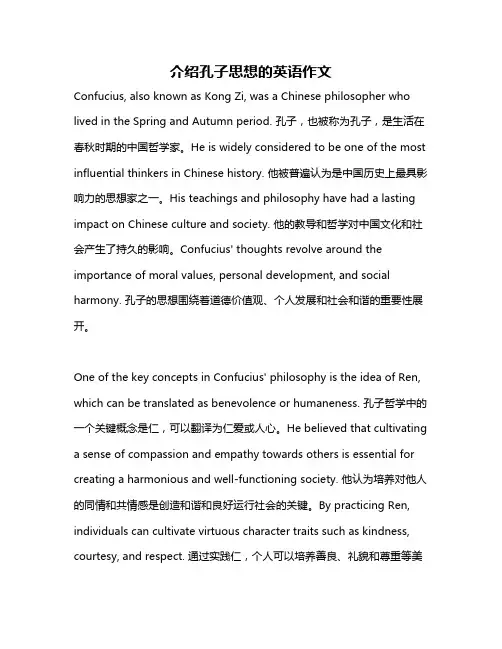
介绍孔子思想的英语作文Confucius, also known as Kong Zi, was a Chinese philosopher who lived in the Spring and Autumn period. 孔子,也被称为孔子,是生活在春秋时期的中国哲学家。
He is widely considered to be one of the most influential thinkers in Chinese history. 他被普遍认为是中国历史上最具影响力的思想家之一。
His teachings and philosophy have had a lasting impact on Chinese culture and society. 他的教导和哲学对中国文化和社会产生了持久的影响。
Confucius' thoughts revolve around the importance of moral values, personal development, and social harmony. 孔子的思想围绕着道德价值观、个人发展和社会和谐的重要性展开。
One of the key concepts in Confucius' philosophy is the idea of Ren, which can be translated as benevolence or humaneness. 孔子哲学中的一个关键概念是仁,可以翻译为仁爱或人心。
He believed that cultivating a sense of compassion and empathy towards others is essential for creating a harmonious and well-functioning society. 他认为培养对他人的同情和共情感是创造和谐和良好运行社会的关键。
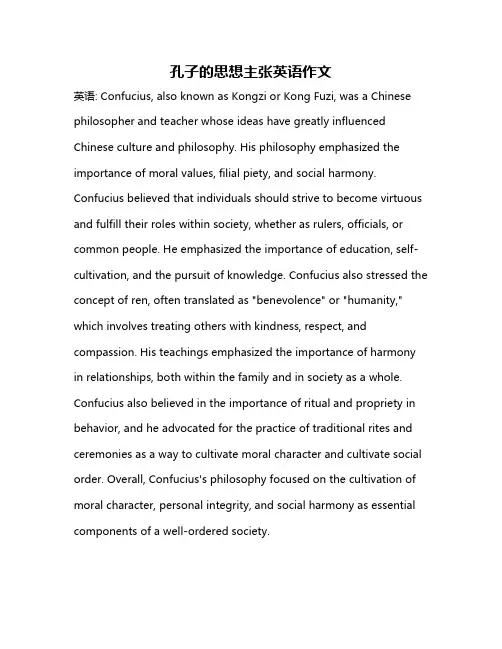
孔子的思想主张英语作文英语: Confucius, also known as Kongzi or Kong Fuzi, was a Chinese philosopher and teacher whose ideas have greatly influenced Chinese culture and philosophy. His philosophy emphasized the importance of moral values, filial piety, and social harmony. Confucius believed that individuals should strive to become virtuous and fulfill their roles within society, whether as rulers, officials, or common people. He emphasized the importance of education, self-cultivation, and the pursuit of knowledge. Confucius also stressed the concept of ren, often translated as "benevolence" or "humanity," which involves treating others with kindness, respect, and compassion. His teachings emphasized the importance of harmony in relationships, both within the family and in society as a whole. Confucius also believed in the importance of ritual and propriety in behavior, and he advocated for the practice of traditional rites and ceremonies as a way to cultivate moral character and cultivate social order. Overall, Confucius's philosophy focused on the cultivation of moral character, personal integrity, and social harmony as essential components of a well-ordered society.中文翻译: 孔子,也被称为孔子或孔夫子,是一位中国哲学家和教师,他的思想极大地影响了中国的文化和哲学。
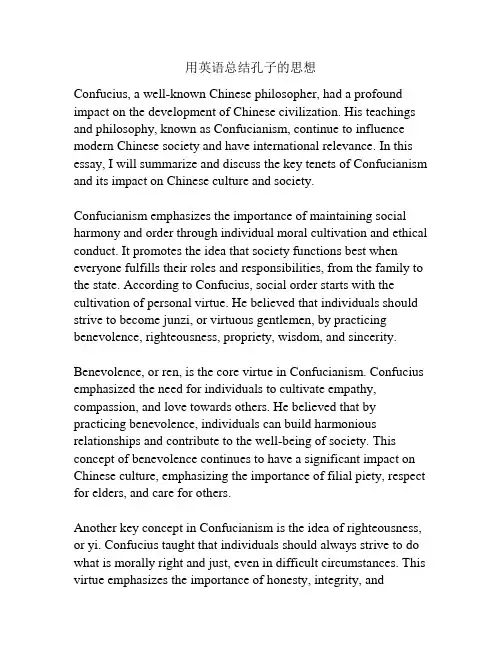
用英语总结孔子的思想Confucius, a well-known Chinese philosopher, had a profound impact on the development of Chinese civilization. His teachings and philosophy, known as Confucianism, continue to influence modern Chinese society and have international relevance. In this essay, I will summarize and discuss the key tenets of Confucianism and its impact on Chinese culture and society.Confucianism emphasizes the importance of maintaining social harmony and order through individual moral cultivation and ethical conduct. It promotes the idea that society functions best when everyone fulfills their roles and responsibilities, from the family to the state. According to Confucius, social order starts with the cultivation of personal virtue. He believed that individuals should strive to become junzi, or virtuous gentlemen, by practicing benevolence, righteousness, propriety, wisdom, and sincerity.Benevolence, or ren, is the core virtue in Confucianism. Confucius emphasized the need for individuals to cultivate empathy, compassion, and love towards others. He believed that by practicing benevolence, individuals can build harmonious relationships and contribute to the well-being of society. This concept of benevolence continues to have a significant impact on Chinese culture, emphasizing the importance of filial piety, respect for elders, and care for others.Another key concept in Confucianism is the idea of righteousness, or yi. Confucius taught that individuals should always strive to do what is morally right and just, even in difficult circumstances. This virtue emphasizes the importance of honesty, integrity, andfairness. Confucius believed that through righteousness, one could achieve social harmony and justice.Propriety, or li, is another essential element in Confucian thought. It refers to the observance of proper rituals, etiquette, and norms of behavior. Confucius believed that practicing propriety helps maintain social order and stability. It emphasizes the importance of respecting the hierarchical relationships in society, such as those between ruler and subject, husband and wife, and father and son.Wisdom, or zhi, is another virtue emphasized in Confucian thought. It highlights the importance of knowledge, learning, and self-improvement. Confucius believed in the lifelong pursuit of knowledge and wisdom. He valued education and believed that individuals had a moral obligation to continually cultivate their minds and expand their understanding of the world.Sincerity, or xin, is the final virtue in Confucianism. It emphasizes the importance of honesty, authenticity, and genuine intentions in all aspects of life. Confucius believed that individuals should practice sincerity in their interactions with others, as well as in their own self-reflection. By cultivating sincerity, individuals can build trust and foster meaningful relationships.Confucius also emphasized the importance of moral leaders and good governance. He believed that a virtuous ruler could inspire and lead the people through his moral example. Confucius advocated for the establishment of a just and harmonious society, where the ruler governed with benevolence, righteousness, and wisdom.Confucianism has had a lasting impact on Chinese culture and society. Its teachings have influenced various aspects, including education, politics, family dynamics, and social relationships. Confucian ideals such as respect for authority, emphasis on education, and maintaining social harmony continue to shape modern Chinese cultural values.In conclusion, Confucius's teachings and philosophy have had a profound impact on Chinese civilization. His emphasis on moral cultivation, social harmony, and ethical conduct continues to shape Chinese cultural values and societal norms. Confucianism's teachings on benevolence, righteousness, propriety, wisdom, and sincerity provide a strong foundation for personal and societal development. Confucius's belief in the importance of moral leaders and good governance also continues to be relevant in modern society. Overall, the teachings of Confucius have left a lasting legacy on Chinese culture and continue to inspire individuals worldwide.。
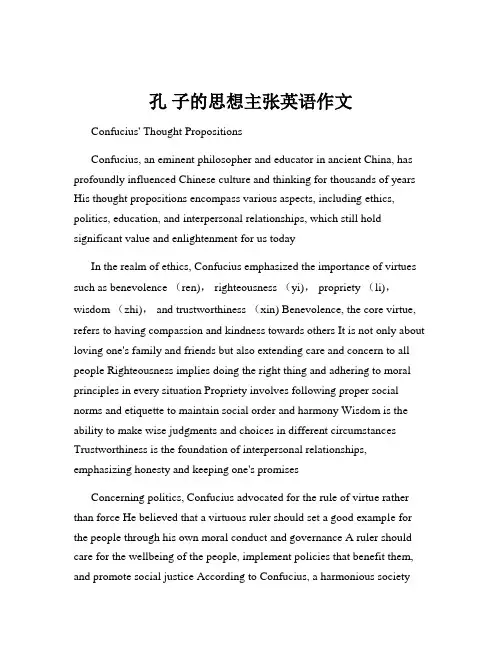
孔子的思想主张英语作文Confucius' Thought PropositionsConfucius, an eminent philosopher and educator in ancient China, has profoundly influenced Chinese culture and thinking for thousands of years His thought propositions encompass various aspects, including ethics, politics, education, and interpersonal relationships, which still hold significant value and enlightenment for us todayIn the realm of ethics, Confucius emphasized the importance of virtues such as benevolence (ren), righteousness (yi), propriety (li),wisdom (zhi), and trustworthiness (xin) Benevolence, the core virtue, refers to having compassion and kindness towards others It is not only about loving one's family and friends but also extending care and concern to all people Righteousness implies doing the right thing and adhering to moral principles in every situation Propriety involves following proper social norms and etiquette to maintain social order and harmony Wisdom is the ability to make wise judgments and choices in different circumstances Trustworthiness is the foundation of interpersonal relationships, emphasizing honesty and keeping one's promisesConcerning politics, Confucius advocated for the rule of virtue rather than force He believed that a virtuous ruler should set a good example for the people through his own moral conduct and governance A ruler should care for the wellbeing of the people, implement policies that benefit them, and promote social justice According to Confucius, a harmonious societycan be achieved when the ruler is virtuous and the people are respectful and obedientEducation was highly regarded by Confucius He believed that education was not limited to the privileged few but should be accessible to all He emphasized the importance of individualized teaching, recognizing that each student has different talents and abilities Confucius encouraged students to think independently, question, and explore knowledge He also emphasized the importance of learning from practice and reallife experiencesIn interpersonal relationships, Confucius proposed the principles of respect, empathy, and reciprocity He taught that one should respect elders and superiors, show filial piety to parents, and loyalty to friends Empathy requires putting oneself in others' shoes and understanding their feelings and perspectives Reciprocity means treating others as one wishes to be treatedThe influence of Confucius' thought propositions is farreaching It has shaped the values and behaviors of the Chinese people for generations and has also had an impact on other cultures around the worldIn modern society, although the context has changed, the essence of Confucius' thought still offers valuable guidance For instance, in the business world, the principles of trustworthiness and righteousness can contribute to building longterm and stable partnerships In education, individualized teaching and the encouragement of independent thinking are still highly relevantHowever, we should also approach Confucius' thought propositions with a critical mindset Some of his ideas might be constrained by the historicaland social context of his time We need to adapt and apply them in a way that suits the contemporary eraIn conclusion, Confucius' thought propositions are a rich and profound heritage They provide us with wisdom and inspiration, helping us to cultivate moral character, build harmonious relationships, and create a better society By understanding and inheriting these thoughts, we can continue to draw strength and wisdom from them and move forward in our lives and in the development of society。
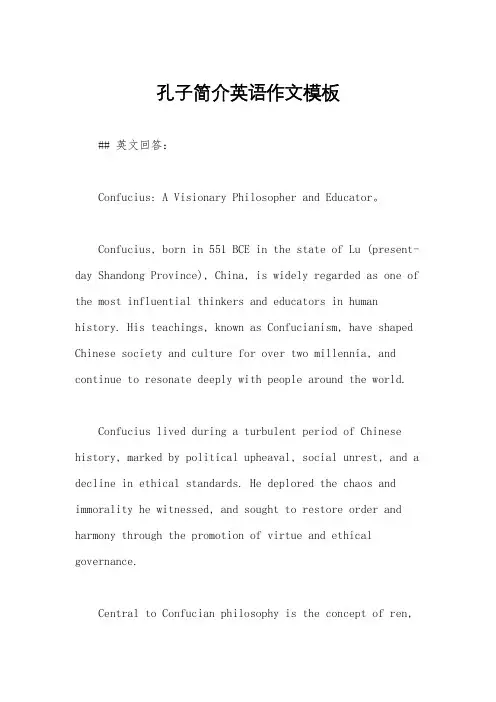
孔子简介英语作文模板## 英文回答:Confucius: A Visionary Philosopher and Educator。
Confucius, born in 551 BCE in the state of Lu (present-day Shandong Province), China, is widely regarded as one of the most influential thinkers and educators in human history. His teachings, known as Confucianism, have shaped Chinese society and culture for over two millennia, and continue to resonate deeply with people around the world.Confucius lived during a turbulent period of Chinese history, marked by political upheaval, social unrest, and a decline in ethical standards. He deplored the chaos and immorality he witnessed, and sought to restore order and harmony through the promotion of virtue and ethical governance.Central to Confucian philosophy is the concept of ren,which can be translated as "humanity" or "benevolence." Ren encompasses a wide range of virtues, including kindness, compassion, empathy, and respect for others. Confucius believed that by cultivating ren, individuals could achieve inner peace, build harmonious relationships, and create a just and prosperous society.Another key Confucian concept is li, which means "ritual" or "propriety." Li refers to the established norms and behaviors that govern human interactions. Confucius emphasized the importance of following li in order to maintain social order and harmony. He believed that by adhering to proper etiquette and respecting authority, individuals could demonstrate their virtue and contribute to the stability of society.Confucius also placed great importance on education. He believed that education was essential for personal growth, social advancement, and the development of a virtuous society. He established the first private academy in China, and devoted his life to teaching and mentoring students from all walks of life.Confucius's teachings were not limited to rulers and scholars, but extended to all levels of society. He believed that everyone had the potential for virtue andthat through education and self-cultivation, they could improve themselves and contribute to the common good.Confucius's profound wisdom and enduring legacy have influenced not only Chinese society but also many other cultures around the world. His teachings on ethics, morality, and education continue to provide valuable guidance and inspiration for individuals and societies alike.Key Confucian Concepts:Ren (Humanity/Benevolence): Kindness, compassion, empathy, respect。
介绍孔子思想的英语作文Confucian Thought: A Timeless Wisdom for a Changing WorldConfucianism, the philosophical and ethical system developed by the ancient Chinese sage Confucius, has had a profound and lasting impact on the cultural landscape of East Asia. At the heart of this rich tradition lies a profound understanding of the human condition and a practical approach to cultivating virtue, harmony, and social order. As the world grapples with complex challenges in the 21st century, the enduring wisdom of Confucian thought offers valuable insights that can guide us towards a more just, compassionate, and sustainable future.One of the core tenets of Confucianism is the emphasis on the cultivation of moral character. Confucius believed that the ultimate goal of human existence was to become a "junzi," or a superior person, who embodies the virtues of benevolence (ren), righteousness (yi), propriety (li), and wisdom (zhi). These virtues were not seen as abstract ideals, but as practical guiding principles that could be cultivated through self-reflection, ethical education, and the fulfillment of one's social roles and responsibilities.At the heart of Confucian ethics is the concept of ren, or benevolence. Ren is often translated as "humaneness" or "compassion," and it represents the fundamental human capacity to care for others and to act with empathy and concern. Confucius believed that by cultivating ren, individuals could not only transform themselves, but also contribute to the creation of a harmonious and just society.Another key aspect of Confucian thought is the emphasis on social harmony and the proper ordering of human relationships. Confucius saw the family as the fundamental unit of society, and he believed that by cultivating harmonious relationships within the family, individuals could then extend these principles to the broader social and political spheres. The concept of filial piety, or respect and care for one's parents and elders, was central to this vision, as it was seen as the foundation for a stable and orderly society.Confucianism also placed a strong emphasis on education and the role of the sage-ruler in guiding the moral and social development of the people. Confucius believed that the ideal ruler was one who embodied the virtues of benevolence, righteousness, and wisdom, and who used these qualities to govern with compassion and justice. The ruler was seen as a moral exemplar, whose actions and decisions would have a profound impact on the lives of the people.One of the most enduring legacies of Confucian thought is its emphasis on the importance of social roles and responsibilities. Confucius believed that individuals could only achieve true fulfillment and self-actualization by fulfilling their social roles and responsibilities, whether as a parent, a child, a ruler, or a subject. This emphasis on social roles and responsibilities has had a lasting impact on the cultural and political landscapes of East Asia, shaping everything from family structures to government institutions.Despite the enduring influence of Confucian thought, it has also faced significant challenges and criticisms over the centuries. Some have argued that Confucianism's emphasis on social hierarchy and the subordination of the individual to the collective can be oppressive and stifling. Others have criticized the tradition's perceived conservatism and resistance to change.However, in the face of these critiques, the enduring relevance of Confucian thought can be seen in its ability to adapt and evolve to meet the needs of a changing world. Contemporary Confucian scholars have sought to reinterpret and recontextualize the tradition's core principles in ways that speak to the pressing issues of our time, from environmental sustainability to global justice and human rights.For example, some Confucian thinkers have argued that thetradition's emphasis on harmony and balance can offer valuable insights for addressing the ecological challenges of the 21st century. Others have emphasized the tradition's emphasis on social responsibility and the common good as a counterpoint to the individualism and materialism that have become hallmarks of modern capitalist societies.Ultimately, the enduring relevance of Confucian thought lies in its ability to offer a comprehensive and holistic vision of human flourishing that is grounded in timeless values of virtue, social harmony, and moral responsibility. As the world grapples with the complex challenges of the 21st century, the wisdom of Confucianism can serve as a valuable resource for individuals and societies seeking to cultivate a more just, compassionate, and sustainable future.。
孔子及其思想介绍英语作文英文:Confucius, also known as Kong Zi in Chinese, was a prominent Chinese philosopher and educator who lived during the Spring and Autumn period of Chinese history. He is widely regarded as one of the most important andinfluential figures in Chinese history and his teachings have had a lasting impact on Chinese society and culture.Confucius was born in 551 BC in the state of Lu, in what is now modern-day Shandong province in China. He was born into a noble family, but his father died when he was young, leaving his family in poverty. Despite his difficult circumstances, Confucius was determined to pursue an education and he dedicated himself to studying the ancient texts and traditions of China. He eventually became a teacher and philosopher, and his ideas about ethics, morality, and social harmony have had a profound influence on Chinese thought and culture.One of the central concepts in Confucianism is the idea of ren, which can be translated as "benevolence" or "humaneness." Confucius believed that the key to a harmonious society lay in cultivating virtuous individuals who would act with compassion and kindness towards others. He emphasized the importance of filial piety, respect for elders, and the cultivation of personal virtues such as honesty, integrity, and self-discipline.Another important aspect of Confucian thought is the concept of li, which can be translated as "ritual" or "propriety." Confucius believed that proper conduct and behavior were essential for maintaining social order and harmony. He advocated for the observance of traditional rituals and ceremonies as a way of promoting social cohesion and reinforcing moral values.In addition to his teachings on ethics and morality, Confucius also emphasized the importance of education and self-cultivation. He believed that individuals shouldstrive for self-improvement and lifelong learning, and heplaced a strong emphasis on the value of scholarship and intellectual pursuits.Confucius' ideas have had a lasting impact on Chinese society and culture, and his teachings continue to be studied and respected in China and around the world. His emphasis on ethical behavior, social harmony, and the importance of education have helped to shape the moral and ethical values of Chinese society for over two thousand years.中文:孔子,也被称为孔子,是中国春秋时期一位杰出的哲学家和教育家。
孔子的教育思想英文总结Confucius, also known as Kong Zi, was a Chinese philosopher and educator who lived during the Spring and Autumn period of Chinese history. His teachings on education have greatly influenced Chinese culture and have been influential in shaping the educational systems of many countries in East Asia. Confucius believed that education was the key to personal and societal improvement, and that education should be accessible to everyone. His education philosophy emphasized the cultivation of character, moral values, and social harmony. This essay will provide a comprehensive summary of Confucius' education philosophy in 1000 words.At the core of Confucius' education philosophy is the concept of self-cultivation. Confucius believed that individuals should strive to be morally upright and virtuous in their actions and behavior. He emphasized the importance of self-discipline, self-reflection, and self-improvement. According to Confucius, education should not only focus on intellectual development, but also on the development of moral character. He believed that individuals should constantly strive to better themselves and to become more virtuous.Confucius also believed that education should be practical and result-oriented. He emphasized the importance of learning by doing, and believed that knowledge should be applied in real-life situations. Confucius believed that education should prepare individuals for their roles and responsibilities in society. He advocated for the teaching of practical skills and knowledge that would be useful in everyday life. Confucius believed thateducation should not be purely theoretical, but that it should have practical applications and be relevant to the needs of society.Another important aspect of Confucius' education philosophy is the importance of social harmony and order. Confucius believed that education should promote social harmony and order, and that individuals should learn to fulfill their social roles and responsibilities. He believed that individuals should respect and obey authority, and should prioritize the well-being of the collective over individual interests. Confucius believed that education should promote social cohesion and would help to maintain a stable and harmonious society.Confucius also emphasized the importance of the teacher-student relationship in education. He believed that teachers should serve as role models and should inspire and guide their students. Confucius believed in the power of mentorship and believed that students should be loyal and respectful towards their teachers. He emphasized the importance of a strong teacher-student relationship, and believed that students could learn from the wisdom and experience of their teachers.In terms of educational methods, Confucius believed in the use of dialogue and questioning. He believed that students should actively engage in the learning process and should question and challenge ideas. Confucius believed that learning should be an active process, and that students should be encouraged to think critically and independently. He also believed in the importance of memorization and repetition in the learning process.Confucius also believed in the importance of a well-rounded education. He believed that individuals should be educated in a variety of disciplines, including literature, history, music, and arts. Confucius believed that a well-rounded education would help individuals to develop a broad understanding of the world and would cultivate their intellect and creativity.In conclusion, Confucius' education philosophy centered around self-cultivation, practicality, social harmony, mentorship, active learning, and a well-rounded education. He believed that education should aim to develop individuals' moral character, practical skills, and social responsibilities. Confucius' teachings have had a profound impact on Chinese education and have helped shape the educational systems of many countries in East Asia. His ideas on education continue to be relevant in today's modern world, as they emphasize the importance of personal growth, social harmony, and the pursuit of knowledge.。
介绍孔子的思想英语作文Confucius and His Philosophical LegacyConfucius, also known as Kong Fuzi or Master Kong, was a Chinese philosopher and thinker who lived during the Spring and Autumn period of ancient China. Born in 551 BCE in the state of Lu, Confucius is considered one of the most influential figures in Chinese history, and his teachings have had a profound impact on the cultural and social fabric of East Asia.Confucianism, the philosophical system that emerged from Confucius' teachings, emphasizes the importance of ethical behavior, social harmony, and the cultivation of virtues such as benevolence, righteousness, propriety, and filial piety. Confucius believed that by cultivating these virtues, individuals could not only improve themselves but also contribute to the overall well-being of society.One of the central tenets of Confucianism is the concept of ren, or benevolence. Confucius believed that the foundation of a harmonious society was rooted in the cultivation of compassion and concern for others. He taught that individuals should strive to be kind, empathetic, and considerate in their interactions with others,and that by doing so, they could create a more just and peaceful world.Another key aspect of Confucian thought is the emphasis on social roles and relationships. Confucius believed that individuals should fulfill their duties and responsibilities within the social hierarchy, whether as a ruler, a subject, a father, or a son. He taught that by upholding these social roles and maintaining proper etiquette and propriety, individuals could contribute to the overall stability and harmony of society.The concept of filial piety, or xiao, is also a central tenet of Confucianism. Confucius believed that individuals should show respect and obedience to their elders, particularly their parents and ancestors. He taught that by honoring one's parents and ancestors, individuals could cultivate a sense of respect for tradition and a deeper connection to their cultural heritage.In addition to these core principles, Confucianism also emphasizes the importance of education and self-cultivation. Confucius believed that individuals should continually strive to improve themselves through the study of classical texts, the cultivation of virtues, and the development of practical skills. He saw education as a means of not only acquiring knowledge but also cultivating moral character and social responsibility.One of the key texts of Confucianism is the Analects, a collection of Confucius' teachings and sayings compiled by his disciples. The Analects provide a window into Confucius' philosophical and ethical worldview, and they have been studied and interpreted by scholars and thinkers throughout East Asian history.Confucianism has had a profound impact on the cultural and social development of East Asia, influencing the political, educational, and social systems of countries such as China, Japan, Korea, and Vietnam. Its emphasis on social harmony, ethical behavior, and the cultivation of virtues has shaped the way that individuals in these societies view their roles and responsibilities within the larger social fabric.Despite the enduring influence of Confucianism, it has also faced criticism and challenges over the centuries. Some have argued that Confucianism is too rigid and hierarchical, and that it can stifle individual autonomy and creativity. Others have criticized Confucianism for its patriarchal and conservative tendencies, and have called for a more progressive and egalitarian approach to social and political organization.Nonetheless, the core principles of Confucianism continue to be widely studied and discussed, and they continue to shape the cultural and social fabric of East Asia. As the world becomesincreasingly interconnected, the insights and wisdom of Confucianism may also have relevance for individuals and societies beyond East Asia, offering a unique perspective on the pursuit of ethical behavior, social harmony, and personal cultivation.In conclusion, Confucius and his philosophical legacy have had a profound and lasting impact on the cultural and social development of East Asia. Through his emphasis on ethical behavior, social harmony, and the cultivation of virtues, Confucius laid the foundation for a philosophical system that continues to be studied and debated to this day. While Confucianism has faced its share of challenges and criticisms, its enduring influence and relevance in the modern world serve as a testament to the enduring power of Confucius' teachings and the timeless wisdom they contain.。
孔子及其思想介绍英语作文下载温馨提示:该文档是我店铺精心编制而成,希望大家下载以后,能够帮助大家解决实际的问题。
文档下载后可定制随意修改,请根据实际需要进行相应的调整和使用,谢谢!并且,本店铺为大家提供各种各样类型的实用资料,如教育随笔、日记赏析、句子摘抄、古诗大全、经典美文、话题作文、工作总结、词语解析、文案摘录、其他资料等等,如想了解不同资料格式和写法,敬请关注!Download tips: This document is carefully compiled by theeditor. I hope that after you download them,they can help yousolve practical problems. The document can be customized andmodified after downloading,please adjust and use it according toactual needs, thank you!In addition, our shop provides you with various types ofpractical materials,such as educational essays, diaryappreciation,sentence excerpts,ancient poems,classic articles,topic composition,work summary,word parsing,copyexcerpts,other materials and so on,want to know different data formats andwriting methods,please pay attention!Confucius, also known as Kongzi, was a Chinese philosopher who lived during the Spring and Autumn period. He was born in 551 BC and is considered one of the most influential thinkers in Chinese history.Confucius believed in the importance of moral values and ethics. He emphasized the concept of "ren," which can be translated as "benevolence" or "humaneness." According to Confucius, ren is the foundation of a harmonious society and should be practiced by all individuals.In addition to ren, Confucius also emphasized the importance of filial piety. He believed that children should respect and honor their parents, and that thisfilial piety is the basis for a well-functioning society.Confucius also believed in the concept of "junzi," which can be translated as "gentleman" or "noble person." According to Confucius, a junzi is someone who embodiesmoral virtues and strives to be a good person. He believed that anyone, regardless of their social status, can becomea junzi through self-cultivation and education.Education was a central aspect of Confucius' philosophy. He believed that education is the key to personal and societal development. Confucius emphasized the importanceof learning and self-improvement, and he believed that individuals should constantly seek to expand their knowledge and understanding of the world.Confucius' teachings had a profound impact on Chinese society and culture. His philosophy shaped the moral and ethical values of the Chinese people, and his ideascontinue to be influential today.In conclusion, Confucius was a Chinese philosopher who emphasized the importance of moral values, filial piety,and education. His teachings continue to shape Chinese society and culture, and his ideas on ethics and personal development are still relevant in today's world.。